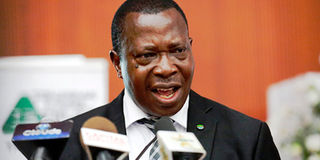Tanzania public officials in trouble over nationals IDs deal scam

Finance and Planning minister Philip Mpango
What you need to know:
Dr Mpango promised that “stern measures” awaited not only officials alleged to be behind flawed tendering at Nida, but across public procurement, which accounts for 70 per cent of recurrent expenditure.
Arusha. An investigation has been launched into the role of public officials behind the Sh28.5 billion tender scandal at the National Identification Authority (Nida).
Those implicated in the recently-uncovered scam will face the full force of the law, Finance and Planning minister Philip Mpango hinted here yesterday.
“There will be no mercy on those found to be behind the mess over the tendering process at Nida,” he told The Citizen after opening the eighth International Public Procurement Conference.
However, Dr Mpango declined to comment further on the deal which came to light recently when newly appointed Home Affairs minister Kange Lugola directed the firms which won the Sh28.5 billion tender to refund the money. The seven companies had won a tender to develop a system for the issuance of national identity cards.
Apparently, the government is not satisfied with the pace of work and wants those which are not ready to finish the work to refund the money already paid to them.
Dr Mpango promised that “stern measures” awaited not only officials alleged to be behind flawed tendering at Nida, but across public procurement, which accounts for 70 per cent of recurrent expenditure. He warned that the days of officials behind rampant malpractices in public procurement were numbered.
The minister hinted that one of the strategies being employed was embracing technology-based solutions, noting that e-procurement was more transparent and efficient.
Opening the conference earlier, Dr Mpango said public procurement, which accounts for 100 per cent of annual development expenditure, was prone to corruption.
He cited the annual performance evaluation reports compiled by the Public Procurement Regulatory Authority (PPRA) which, he added, documented malpractices mostly implicating public procurement officers and bidders.
It was not uncommon to find projects implemented without due regard to value for money, suppliers who quote inflated or unrealistic prices, lack of transparency and phantom projects, which led to “huge costs and losses to the government”.
Dr Mpango said the government was keen on cleaning up public procurement to curb wasteful expenditure.
Public procurement can also be used as a tool to drive industrial development, nurture local firms as well as promote local capacity and technology, he added.
Ms Lilian Mwinuka, the director of the Government Procurement Services Agency (GPSA), told the gathering at the Arusha International Conference Centre (AICC) that losses made in procurement processes have affected service delivery.
She commended measures taken by the government in addressing the issue, including creating a public procurement division at the Finance ministry, but noted that there were still many challenges ahead, including shortage of manpower.
According to the Procurement and Supplies Professional and Technicians Board (PSPTB) – an institution under the Finance ministry – a total of 8,313 candidates have been registered as procurement and supplies professionals.
These range from those in technician and graduate levels to approved and authorised categories. Until last year, there were only ten PhD holders in the profession in the country.




